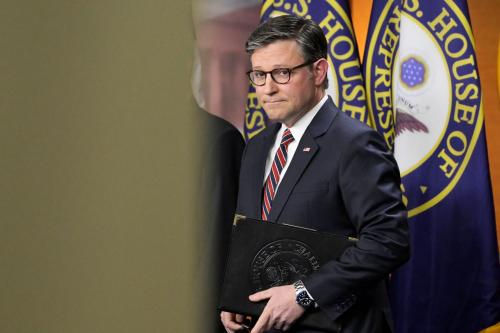In a speech yesterday, President Obama again called on Congress to raise the federal minimum wage. Brookings scholars have continued to offer analysis and recommendations on the issue.
Senior Fellow Gary Burtless offers these six points when thinking about such a policy:
1) The minimum wage is currently lower, in purchasing-power terms, than it was in every year from 1956 through 1983.
2) As the President pointed out in the speech, the minimum wage is even lower in purchasing-power terms than it was in one year of the Truman Administration (1950).
3) Relative to the average wage paid to U.S. workers the current minimum wage is comparatively low by historical standards. Today’s minimum wage is about 37% of the average wage; in 1968 it was a little more than 50% of the average wage. (Source: Economic Policy Institute)
4) The empirical evidence on the effect of boosting the minimum wage, even in slack labor markets, suggests that the adverse employment effects are small. The adverse effects are primarily concentrated on workers who are under age 20, and those minimum-wage workers account for less than a quarter of all workers earning the minimum wage. Even for teenage workers the adverse employment impact is likely to be comparatively small.
5) Even using opponents’ estimates of the adverse employment effects of a minimum-wage hike, low income workers as a whole end up considerably better off after the minimum wage is raised. That is because the weekly earnings gains enjoyed by low-wage workers who remain employed is considerably bigger than the weekly earnings lost as a result of lower employment. Low-wage workers recognize this fact, which is why they support a minimum-wage hike by a sizeable margin.
6) In fact, increasing the minimum wage commands broad support in the adult population. It is one of the few explicitly redistributive measures of the government that enjoys such broad popular support.
Appearing on Wall Street Journal Live, Burtless also answered the question of whether raising the minimum wage will help or hurt the economy. Watch the interview below, in which Burtless says that “There’s very little evidence that there is very much adverse impact of a rise in the minimum wage on employment even when there is a lot of labor market slack as there is right now.”
He explains that while teenagers may be negatively impacted, most workers over the age of 20—the majority of low-wage workers—will see their weekly earnings improve.
Richard Reeves and Joanna Venator also examined what the president got right and what he got wrong about social mobility in his speech.
The Brookings Institution is committed to quality, independence, and impact.
We are supported by a diverse array of funders. In line with our values and policies, each Brookings publication represents the sole views of its author(s).




Commentary
6 Facts about a Minimum Wage Increase
December 5, 2013